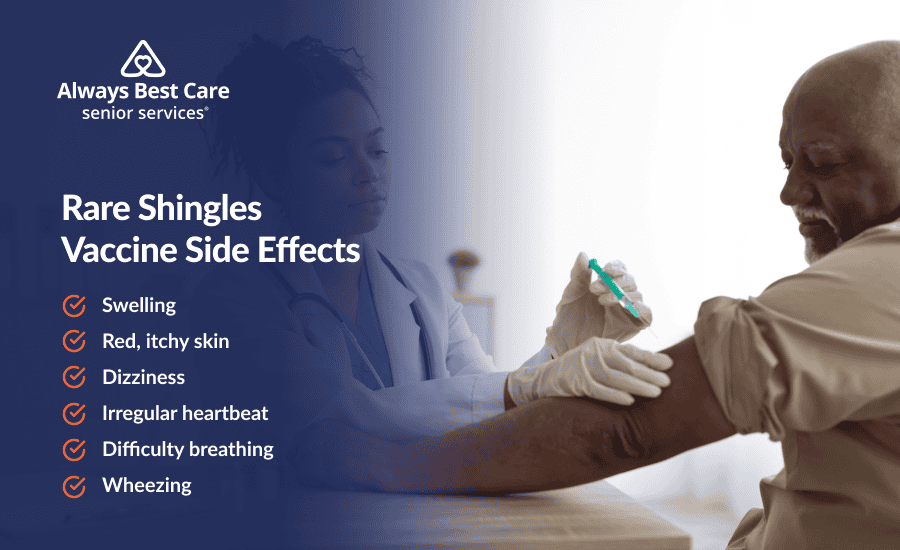Common (and Rare) Shingles Vaccine Side Effects [+ FAQs]
![Common (and Rare) Shingles Vaccine Side Effects [+ FAQs]](https://cdn.alwaysbestcare.com/wp-content/uploads/2025/10/shingles-vaccine-side-effects-hero-image.png)
Table of Contents
Shingles Vaccine Side Effects: Key Takeaways
- After the shingles shot, your loved one might have a sore arm for two to three days
- These symptoms are normal and show that their immune system is responding
- Watch for signs like trouble breathing, facial swelling, or a high fever, as these could signal a rare allergic reaction and should be treated right away
The shingles vaccine is safe for most people. And surprisingly, new research suggests it might also help lower the risk of dementia.
That said, mild side effects, like soreness, fatigue, or a low fever, are pretty common on the first day or two after the shot.
Not sure if this vaccine is the right call for your loved one? We’re here to help you figure it out.
In this guide, we will:
- Share what to expect after the shingles (SHINGRIX) vaccine, from common to rare side effects
- Cover who the vaccine is for and when it might not be the right fit
- Explore the controversy surrounding the vaccine
- Discover how Always Best Care can help your loved one while they recover
Mild Shingles Vaccine Side Effects
Most people feel fine after the shingles vaccine, but it’s not unusual to feel a bit off for a day or two.
Think of it as your body gearing up its defenses. That little jab in the arm is telling your system, “Get ready!” and your body listens.
As a result, your elderly loved one might feel the following:
- Muscle aches
- More tired than usual
- A dull headache
- Slight fever or chills
- Some stomach grumbles or queasiness
These symptoms usually don’t stick around and only last just two or three days. They’re also a good sign your loved one’s immune system is doing its job.
At the injection site, your loved one might also notice:
- Redness
- Swelling
- Itchiness or soreness
Is It Something More? Serious Shingles Vaccine Side Effects
This vaccine is considered safe, but as with most medical treatments, there’s a small chance of a more serious reaction.
These are extremely rare, but it’s important to know what to look for, so your senior loved one can act quickly if something doesn’t seem right.
One rare but serious reaction is anaphylaxis, a severe allergic response that can occur soon after the vaccine is given. Without immediate treatment, it can be life-threatening.
Watch for these signs:
- Hives or red, itchy skin
- Dizziness
- A racing or irregular heartbeat
- Difficulty breathing or wheezing
- Swelling around the face, especially the lips, eyes, or throat

Shingles Vaccine Side Effects: How Long Do They Last?
Most side effects from the shingles vaccine are short-lived, typically lasting about two to three days.
During this time, your loved one might feel a bit under the weather, like they’re coming down with something.
That’s actually a good sign, and it means their immune system is kicking in!
What Is the Controversy With the SHINGRIX Vaccine?
The SHINGRIX vaccine is widely recommended and considered safe for most adults, especially those over 50. However, like all vaccines, it’s been carefully monitored for potential side effects.
In 2021, the FDA added a black box warning about a possible increased risk of Guillain-Barré syndrome (GBS), a rare nerve condition that causes weakness and tingling in the limbs.
It’s important to note that this potential risk appears to be low, and the vaccine’s overall safety record remains strong.

Should My Loved One Get the Shingles Vaccine?
If your loved one is age 50 or older, the short answer is yes, the shingles vaccine is strongly recommended.
According to the CDC, adults in this age group should get two doses of SHINGRIX, spaced two to six months apart, to help prevent shingles and its complications.
It’s also recommended for:
- Anyone who’s had shingles before (just wait until the rash is completely healed before starting the vaccine series)
- Those who previously received Zostavax, the older shingles vaccine
When Is the Shingles Vaccine Not a Good Idea?
There are a few situations where your loved one should skip getting the vaccine.
They should not get SHINGRIX if they:
- Had a severe allergic reaction to it in the past
- Tested negative for chickenpox immunity (in that case, they should get the chickenpox vaccine instead)
If you’re unsure or have questions, their doctor can walk you through what’s best based on their age, medical history, and immune health.
How To Care for Your Loved One After Their Shingles Shot
Most people feel fine after getting the shingles shot, but it’s common to have mild side effects that last a couple of days.
This is where you come in. A little care and comfort can go a long way in helping them bounce back quickly.
- Encourage rest: Fatigue is one of the most common side effects. Give your loved one space to rest, nap, or take it easy for a day or two.
- Offer water and light meals: Staying hydrated helps flush out toxins and supports the immune system. If they’re not feeling well, prepare easy-to-digest meals like soup or toast.
- Use a cool compress: If the injection site is sore or swollen, a clean, cool cloth can reduce discomfort.
- Keep an eye on symptoms: Mild side effects like achiness, low-grade fever, or a headache are normal. But if anything feels unusual or lasts longer than three days, especially symptoms like high fever, trouble breathing, or a rash, call their doctor.
- Help with daily tasks and grooming: Even small things like making tea, walking the dog, or managing medications can feel overwhelming when someone isn’t feeling their best. Stepping in, even briefly, can be a huge relief.
- Be reassuring: Let them know these side effects are temporary and that they’re doing the right thing to stay protected. A little encouragement goes a long way.
What Your Loved One Shouldn’t Do After Getting Their Shingles Shot
Once your loved one gets their shingles shot, they might feel a little off. It’s nothing to worry about, but a little TLC can make a big difference.
To help them bounce back faster, here are some expert recommendations:
- Don’t overdo it: Heavy lifting, intense exercise, or anything too physically demanding can make soreness or fatigue worse. Encourage them to take it easy.
- Avoid alcohol: A glass of wine might seem harmless, but alcohol can dehydrate the body and may worsen side effects like dizziness or nausea.
- Skip unfamiliar food: Your loved one’s stomach might be a bit sensitive, so it’s best to stick with light and easy-to-digest meals until they’re feeling back to normal.
- Don’t ignore unusual symptoms: Trust your gut. If your loved one feels something off, it probably deserves a quick call to the doctor.
Support Your Loved One After Their Vaccine Shot With Always Best Care Senior Services
While we don’t offer vaccinations, Always Best Care provides in-home care to help your loved one recover comfortably.
If your loved one’s feeling a bit run-down or just needs some extra support around the house, we’re here to step in and make things easier.
Our compassionate caregivers can step in with just the right level of support to ensure your loved one feels safe, comfortable, and cared for during recovery.
Need short-term help after a vaccine or long-term care planning? We’re just a call away. Let Always Best Care provide the trusted care your family deserves.
SHINGRIX Vaccine Side Effects: FAQs
Are the side effects from the second SHINGRIX shot worse than the first?
Headaches and chills were reported more often after the second dose in clinical trials, so your loved one might feel a bit more run-down the second time around.
Can your loved one take over-the-counter medicine for side effects?
Yes. If they’re feeling sore or running a mild fever, medications like Tylenol or Advil can help take the edge off.
Just remember that what worked for them last year might not be best now, especially if their meds have changed.
Is SHINGRIX a live virus vaccine?
No, SHINGRIX isn’t a live virus vaccine.
It only uses a tiny, inactive piece of the virus, so it can’t give you shingles or spread it to anyone else. It’s designed to safely trigger your immune system without using the whole, live virus.
What happens if your elderly loved one skips the second SHINGRIX shot?
Without the second dose, their protection might fall short, and they could still get shingles. Most people need two shots, spaced two to six months apart.
Can your elderly loved one get both the flu and shingles vaccines in one visit?
Yes, individuals can safely get the flu shot right after receiving the shingles vaccine.
In fact, if it’s easier for your schedule, both vaccines can even be given at the same appointment.
Want to learn about other vaccines recommended for older adults? These guides are a great place to start:





